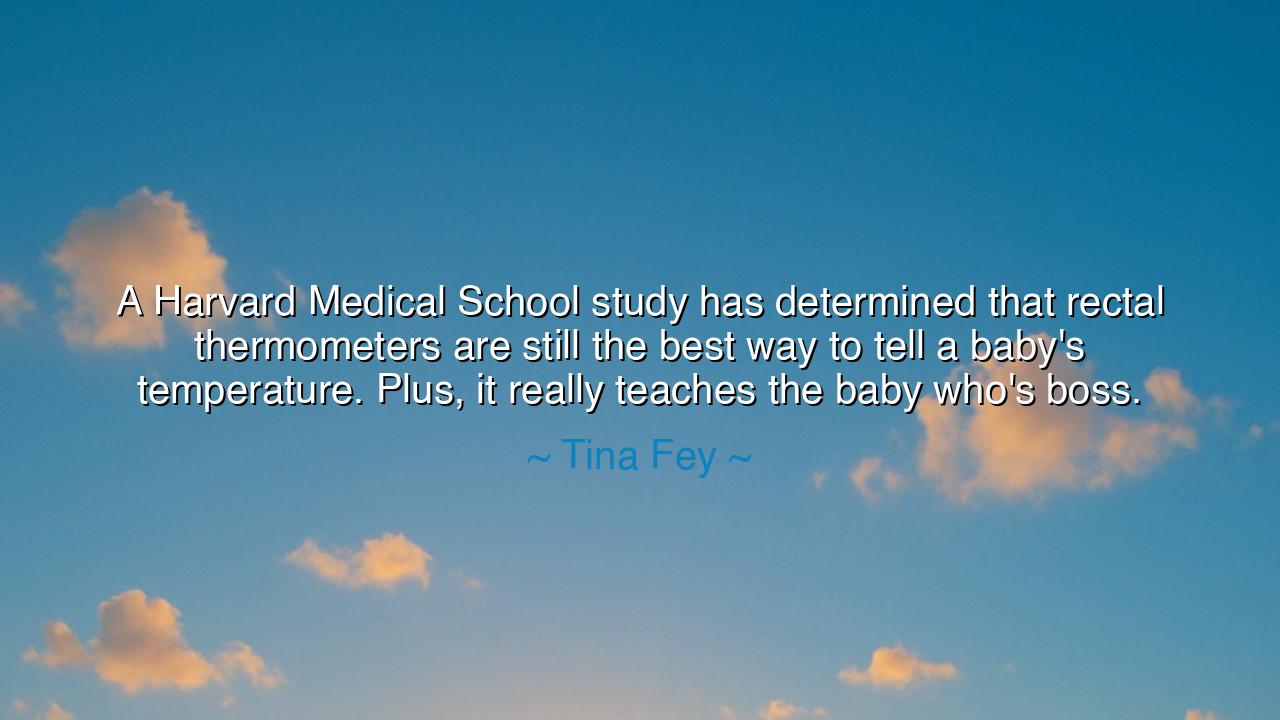
A Harvard Medical School study has determined that rectal
A Harvard Medical School study has determined that rectal thermometers are still the best way to tell a baby's temperature. Plus, it really teaches the baby who's boss.






"A Harvard Medical School study has determined that rectal thermometers are still the best way to tell a baby's temperature. Plus, it really teaches the baby who's boss." In these sharp and humorous words, Tina Fey weaves a complex truth about the tension between parental authority and the vulnerability of a child's dependence. At first glance, her statement might seem lighthearted and absurd, but it cuts to the heart of a greater societal observation: the ways in which we use tools—whether for health, control, or understanding—often reflect the power dynamics in care and nurturing. Fey's playful remark subtly acknowledges the discomfort inherent in certain parental roles, especially when it comes to medical authority and the ways in which parents enforce their control, even over the smallest and most helpless members of society.
In the ancient world, medical authority was largely in the hands of those who held wisdom—often the priests, healers, or those with specialized knowledge. The Egyptians, for instance, were known for their deep knowledge of the human body, which they combined with spiritual beliefs. In the ancient Greek world, Hippocrates is considered the father of modern medicine, but his approach was not just about physical care; it was about the balance of the body’s elements and the patient’s mental state. The ancient belief that healing required a holistic approach often meant that the healer held significant power over the patient. Even so, this power was tempered by respect and responsibility, as the healer’s role was not just to administer treatment but to guide the patient toward health.
However, the modern world has altered the nature of this relationship. As Fey highlights in a satirical light, the ways we now measure and maintain health have become increasingly mechanical, perhaps to the point where we forget the human element. The rectal thermometer, despite its invasiveness, is seen as one of the most accurate ways to measure a baby’s temperature, yet its very use points to an uncomfortable reality: medicine and care can sometimes be about more than just healing. The thermometer, as Fey suggests, becomes a subtle assertion of power—a way for the parent to reaffirm control, even in situations that might otherwise be defined by helplessness and vulnerability.
This conflict between compassion and control is a theme that runs through much of human history. The Romans, for example, placed a high value on the role of the paterfamilias, the father of the family, whose authority was absolute. The father’s decision was final, from matters of health to the very lives of his children. Even as the Romans valued strength and authority, their legal systems began to evolve to incorporate more compassionate principles, acknowledging the need for care and respect in family relationships. The role of the parent as the ultimate authority was questioned, much like Fey humorously challenges our modern assumptions about parenting and medical authority.
When we shift to more modern examples, the humor in Fey’s quote draws attention to how society has evolved in terms of parenting and care. While Fey’s joke reflects a moment of inconvenience and discomfort, it also highlights a larger societal theme: the balance between nurturing and discipline. The baby’s vulnerability and helplessness serve as the perfect metaphor for how humans, in all stages of life, need to reconcile the tension between care and control. Whether it's the difficult process of giving medicine to a sick child or the strict authority of ancient civilizations, the real lesson lies in the delicate balance between authority and compassion, leadership and nurturing.
What Fey's statement points to is the often unspoken struggle between parental love and power. It is a subtle reminder of the delicate, sometimes uncomfortable, role of the caregiver, who must always negotiate between maintaining authority and providing comfort. Like Hippocrates, who balanced the practical application of medicine with an understanding of the human spirit, we too must navigate the fine line between administering care and exercising control. Each situation requires us to ask: is the tool we are using—whether a thermometer, a law, or a discipline—truly helping, or is it simply asserting dominance in a time of vulnerability?
The lesson here is that true care and leadership come not from asserting control or authority, but from understanding when to let go of power and when to exercise it. It is easy to confuse love with control, but the most profound acts of nurturing come from an understanding that true power lies not in domination, but in compassion and empathy. Like Fey’s tongue-in-cheek remark, we are reminded that sometimes the tools we use in parenting, medicine, and even in our daily lives, may serve more than one purpose. They are not just practical solutions, but metaphors for how we understand and navigate the complexities of human relationships.
In our own lives, let us take the lesson from Tina Fey’s words to heart: in every moment of authority, whether in the role of parent, leader, or caretaker, we must remain aware of the balance between control and care. Let us seek to understand the vulnerability of those we serve, and approach them with the respect they deserve. In the same way that the rectal thermometer is a tool to check health, let us ensure that the tools of our lives—be they in parenting, leadership, or medicine—are used not to assert dominance, but to promote well-being and compassion. Through humility and wisdom, we can build a world where power is always tempered by the tenderness of care.






AAdministratorAdministrator
Welcome, honored guests. Please leave a comment, we will respond soon